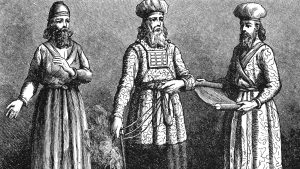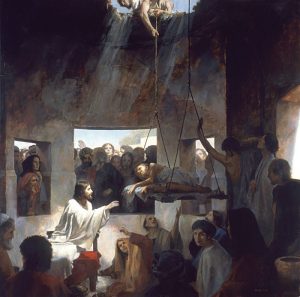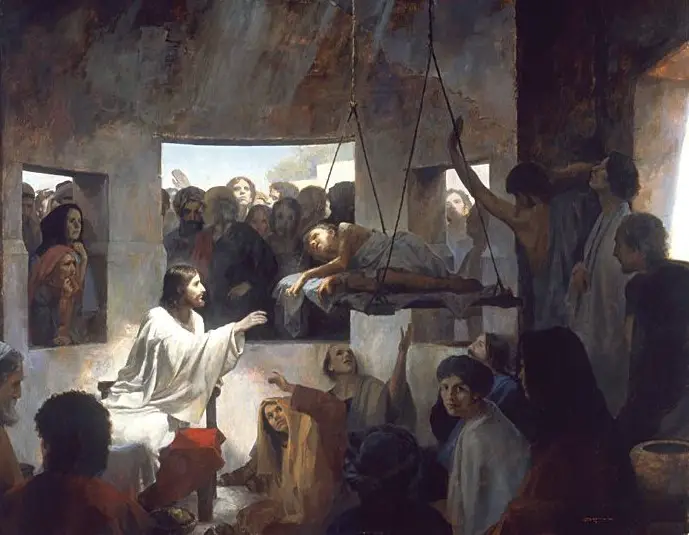A paralyzed man and his friends went to see Jesus but were unable to reach him because the house where he was teaching was too crowded. So the man’s friends lowered him through the roof.[1] When Jesus saw their faith, he forgave the man’s sins:
Luke 5:20-26 (NASB) Seeing their faith, He said, “Friend, your sins are forgiven you.” 21 The scribes and the Pharisees began to reason, saying, “Who is this man who speaks blasphemies? Who can forgive sins, but God alone?” 22 But Jesus, aware of their reasonings,[2] answered and said to them, “Why are you reasoning in your hearts? 23 “Which is easier, to say, ‘Your sins have been forgiven you,’ or to say, ‘Get up and walk’? 24 “But, so that you may know that the Son of Man has authority on earth to forgive sins,”—He said to the paralytic—”I say to you, get up, and pick up your stretcher and go home.” 25 Immediately he got up before them, and picked up what he had been lying on, and went home glorifying God. 26 They were all struck with astonishment and began glorifying God; and they were filled with fear, saying, “We have seen remarkable things today.” (emphasis added)
Many Christians seize upon the statement that the religious leaders made, “Who can forgive sins, but God alone?” in an effort to prove that Jesus is God. They reason that since Jesus forgave the man’s sins, he must be God. However, as we shall see, the context of the statement, as well as the cultural and historical framework upon which it rests, demands a different conclusion.
What would the scribes and Pharisees have understood Jesus to mean?
The scribes and Pharisees, offended by Jesus’ pronouncement, declared him to be a blasphemer because they believed that God alone has the authority to forgive sins. But does this charge mean that they thought the rabbi from Nazareth was claiming to be God? No, it doesn’t. As scribes and Pharisees, they would have followed (or at least claimed to have followed) the Mosaic Law, meaning, they would have known that God had instituted a sacrificial system as a means by which men could be forgiven their trespasses and sins. Furthermore, they would have known that God had ordained men from the tribe of Levi to act as priests or mediators through whom He would extend forgiveness.[3]
Leviticus 19:21-22 (NASB) ‘He shall bring his guilt offering to the LORD to the doorway of the tent of meeting, a ram for a guilt offering. 22 ‘The priest shall also make atonement for him with the ram of the guilt offering before the LORD for his sin which he has committed, and the sin which he has committed will be forgiven him. (emphasis added)

Historically speaking, the nation of Israel had at the time of Jesus, roughly 1,300 years of practical experience with this system of sacrifices and mediators.[4] Thus, the scribes and the Pharisees would most certainly have understood that God forgives through the agency of man, that is, the Levitical priesthood.
Jesus, on the other hand, was not a Levite. Rather, he was from the tribe of Judah, and therefore, was not authorized to forgive sins under the Mosaic covenant. Thus, when taking into account the historical and cultural framework of traditional Judaism, the religious leaders would have viewed Jesus as a slanderer because he did not follow God’s laws regarding sacrifices for the forgiveness of sins.
Being a Torah obedient Jew, Jesus would have agreed with his opposition that it is God who forgives sins. Did not Isaiah record God’s words affirming this truth?
Isaiah 43:25 (NASB) “I, even I, am the one who wipes out your transgressions for My own sake, and I will not remember your sins. (emphasis added)
But the time had come, just as God had promised, to institute a new covenant for the forgiveness of sins.[5] And God had appointed Jesus as its high priest and mediator:
Hebrews 2:17 (NASB) Therefore, He [Jesus] had to be made like His brethren in all things, so that He might become a merciful and faithful high priest in things pertaining to God, to make propitiation for the sins of the people. (emphasis added)
This is what the miracle Jesus performed on the paralytic was designed to confirm: “so that you may know that the Son of Man has authority on earth to forgive sins.” The miracle was not proof that the scribes and Pharisees were right, that only God can forgive sins, that is, through the agency of the Levitical priesthood. On the contrary, it was proof that they were wrong. Jesus said he had authority to forgive sins, not because he was God, but because he was the Son of Man, a reference to his role as God’s human messiah.[6] Thus, the miracle proved that Jesus, a man, had been given authority by God to both heal[7] and forgive sins apart from the Levitical priesthood. The crowd who witnessed the paralytic pick up his pallet and walk, clearly understood the point of Jesus’ miracle:
Matthew 9:8 (NASB) But when the crowds saw this, they were awestruck, and glorified God, who had given such authority to men. (emphasis added)

Here the word authority in the Greek is exousia. According to HELP Word Studies, it means: authority, conferred power; delegated empowerment (“authorization”) operating in a designated jurisdiction.[8] Thayer’s Greek Lexicon states that exousia here is “the divine authority granted to Jesus as Messiah.”[9] In other words, the authority to forgive the paralytic’s sins was not an innate authority that Jesus’ possessed, rather it was an authority that God had delegated to His messiah. And this is exactly what Jesus was communicating that day: that God had granted the Son of Man the authority to extend God’s forgiveness to Man.
The apostle Peter preached this same message to the Jews:
Acts 5:31 (NASB) “He [Jesus] is the one whom God exalted to His right hand as a Prince and a Savior, to grant repentance to Israel, and forgiveness of sins. (emphasis added)
God exalted Jesus to His right hand and bestowed on him the title of Prince[10] and Savior, in order to extend His forgiveness through His Messiah. As we would expect, Peter preached the same message to the Gentiles:
Acts 10:42-43 (NASB) “And He [Jesus] ordered us to preach to the people, and solemnly to testify that this is the One who has been appointed by God as Judge of the living and the dead. 43 “Of Him all the prophets bear witness that through His name everyone who believes in Him receives forgiveness of sins.” (emphasis added)
Not surprisingly, this is the same message that the apostle Paul preached:
Acts 13:38 (ESV) Let it be known to you therefore, brothers, that through this man forgiveness of sins is proclaimed to you (emphasis added)
Ephsians 4:32 (NASB) Be kind to one another, compassionate, forgiving each other, just as God in Christ also has forgiven you. (emphasis added)
If Jesus were actually God, he wouldn’t need God to give him authority to forgive sins; he would innately possess it. But if he is truly the human Messiah as Scripture teaches, then he would require such authority from God. For this reason, the crowd “glorified God, who had given such authority to men.”[11]
Jesus Forgives an Immoral Woman
 In an event similar to that of the paralytic, Jesus was invited to dine, along with others, at the home of a Pharisee named Simon. While Jesus was reclined at the table, an immoral woman came to him and anointed his feet with costly perfume. As she wept, she kissed his feet and wiped her tears from his feet with her hair. The Pharisees were indignant but Jesus said:
In an event similar to that of the paralytic, Jesus was invited to dine, along with others, at the home of a Pharisee named Simon. While Jesus was reclined at the table, an immoral woman came to him and anointed his feet with costly perfume. As she wept, she kissed his feet and wiped her tears from his feet with her hair. The Pharisees were indignant but Jesus said:
Luke 7:44-49 (NASB) Turning toward the woman, He said to Simon, “Do you see this woman? I entered your house; you gave Me no water for My feet, but she has wet My feet with her tears and wiped them with her hair. 45 “You gave Me no kiss; but she, since the time I came in, has not ceased to kiss My feet. 46 “You did not anoint My head with oil, but she anointed My feet with perfume. 47 “For this reason I say to you, her sins, which are many, have been forgiven, for she loved much; but he who is forgiven little, loves little.” 48 Then He said to her, “Your sins have been forgiven.” 49 Those who were reclining at the table with Him began to say to themselves, “Who is this man who even forgives sins?” 50 And He said to the woman, “Your faith has saved you; go in peace.” (emphasis added)
Again, it’s not that Simon the Pharisee and his guests were unaware that God used men as mediators to extend His forgiveness, but that God would use this man, a rabbi from Nazareth, whom some claimed to be the Messiah. The Jewish mind of the first century made this difficult for some to accept because Jesus did not fit their messianic mold. Likewise, today, those who read these accounts through a Trinitarian lens, find this truth also difficult to accept because it does not fit the fourth century narrative that Jesus is God. But for the Jews who witnessed the paralytic’s healing first hand and for those who are willing to set aside their Trinitarian bias, the evidence is clear. God has appointed a human mediator to extend His forgiveness to mankind under a new covenant:
1 Timothy 2:5 (NASB) For there is one God, and one mediator also between God and men, the man Christ Jesus (emphasis added)
Who can forgive sins, but God alone? Indeed, only God can grant forgiveness of sins, and He has chosen to do so through the man whom He appointed to be His high priest and mediator: Jesus of Nazareth.
[1] Matthew 9:2-8; Mark 2:1-12; Luke 5:17-26.
[2] Some may consider this statement to indicate that Jesus is omniscient and therefore God. For a treatment of this topic see: Is Jesus Omniscient?
[3] See Numbers 18:1-7; Leviticus chapters 4 through 9, etc.
[4] Scholars estimate that the Levitical priesthood was instituted sometime between 1500 and 1200 B.C. More specifically, The Chronological Study Bible sets the date to be around 1275 B.C. (Thomas Nelson, 2008), p. 89.
[5] Hebrews chapter 8; 9:15; Jeremiah 31:31-34.
[6] According to the Dictionary of the Bible, the phrase Son of Man in Daniel’s vision is ” a messianic title.” “Son of Man,” Dictionary of the Bible, John L. McKenzie (New York, NY: Macmillian Publishing Company, 1965), p. 831.
[7] Acts 2:22; 10:38; John 14:10.
[8] HELP Word Studies, https://www.biblehub.com/greek/1849.htm
[9] Thayer’s Greek Lexicon, https://www.biblehub.com/greek/1849.htm
[10] HELP Word Studies: “Prince” is archêgon in the Greek and it means a founder and leader, properly, the first in a long procession; a file-leader who pioneers the way for many others to follow. https://biblehub.com/greek/747.htm
[11] Matthew 9:8.



